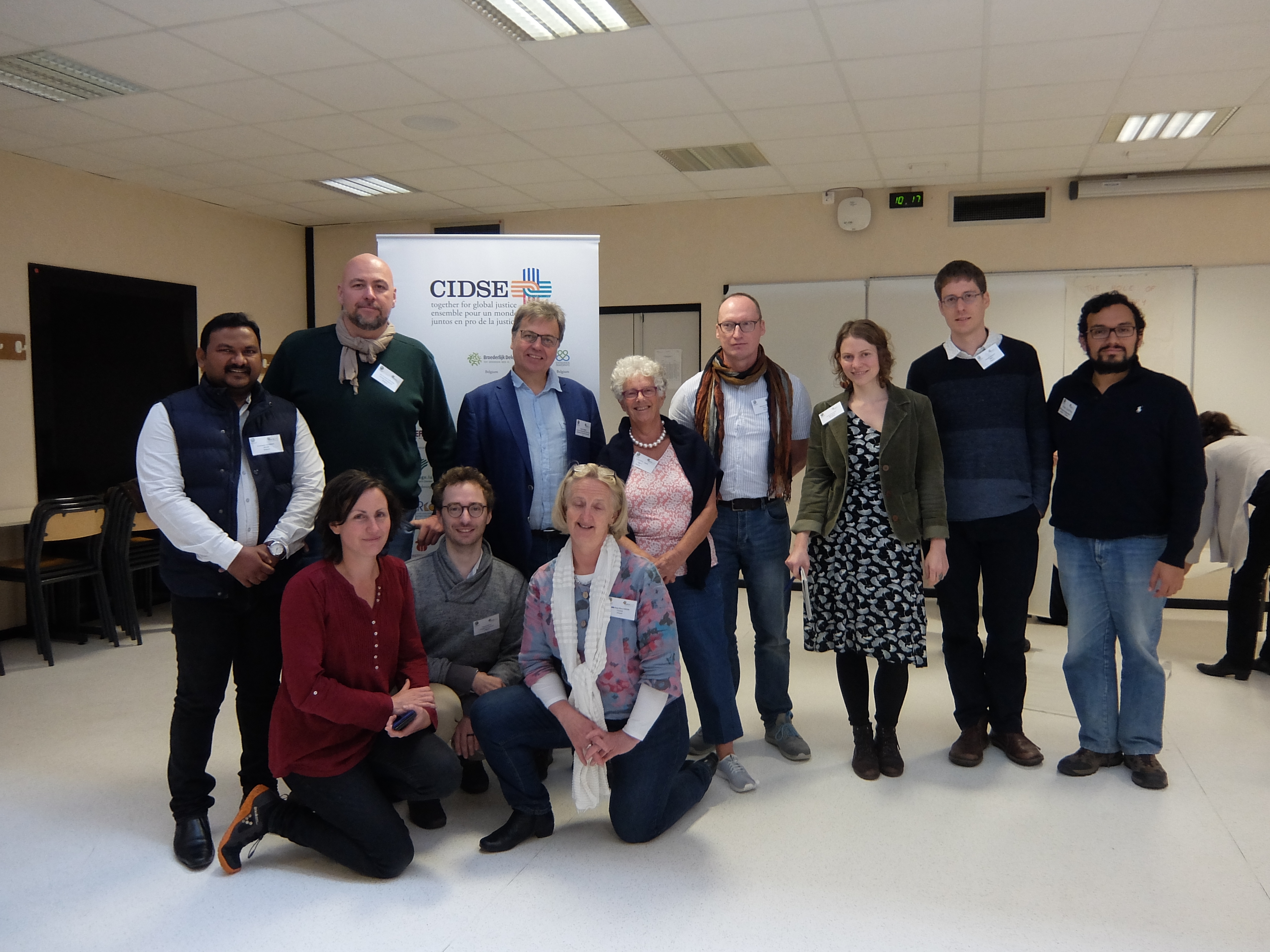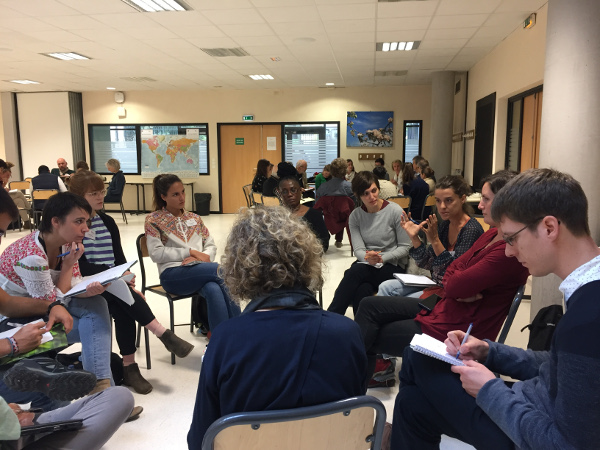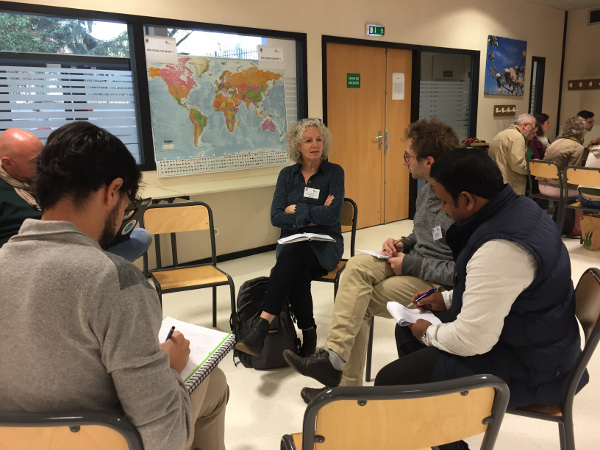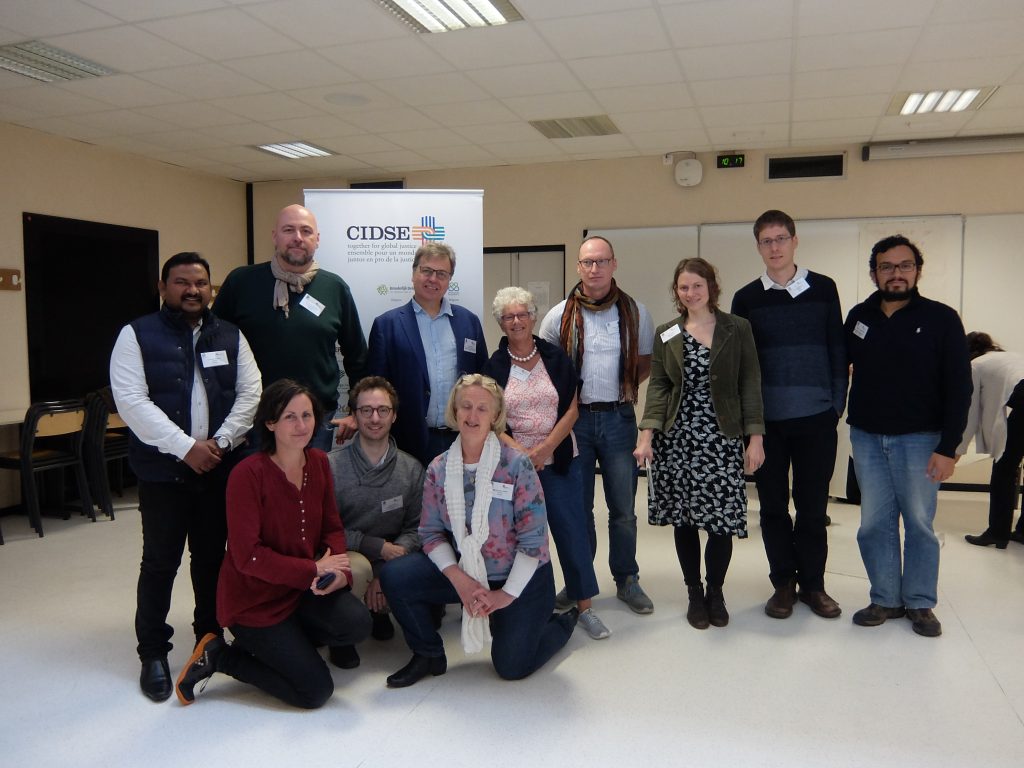
On October 26, at the Agroecology Europe Forum in Lyon, CIDSE organized a workshop entitled “Exploring Agroecology Principles”, to exchange and confront ideas around the intersections between agroecology and social justice, gender, youth, economic viability and climate resilience. Here are some of the highlights from the discussion tables.
Agroecology as a way of bringing social justice
The quality of diets, the threat of land grab, the health of the natural environment are amongst the challenges many communities are faced with today. Their food and nutrition security is interconnected with the respect for their land rights, healthy soils, and waterways. Discussions on how to counter threats such as those presented by extractive industries and megaprojects support thinking on how to protect territory in all its dimensions, social, cultural, environmental and economic.
Agroecology represents a holistic response to these challenges. Representing a way of life as opposed to a production focused system, discussants considering its potential to strengthen relationships within and between communities. The potential of agroecology to provide sustainable livelihoods as a way of consolidating peace was identified as an important attribute in post-conflict contexts like Colombia.
The identification of opportunities to influence public policies that support the promotion of agroecology is key. Alongside political engagement, the development of a critical mass through alliance building with like-minded civil society organizations – including interested consumer, media and faith leaders – was identified as an important strategy for promoting an agroecological policy transition.
Michael O’Brien (Trócaire), led this table with Pedro Guzmán from the Red Nacional de Agricultural Familiar, Colombia.

Agroecology and…Feminism!
On one of the tables of the CIDSE workshop on principles of agroecology, we discussed the central issue of gender equality. Actually, not gender. The common reaction around the table to our initial presentation was that we should use the term –feminism-. In order to avoid limiting ourselves to technical issues and forgetting the political and social aspects: There is no agroecology without feminism! It is a message, a warning, expressed several times and in different ways and related to the different themes of these past three days: do not limit agroecology to a technical practice! Above all, it is a matter of achieving social justice.
But back to gender, or rather, feminism and agroecology. We learned that during the construction of agroecology these past decades, it was rather patriarchal in nature itself! It started as a struggle of male farmers, fighting to reassert their rights over land but with little attention for the rights of female farmers. Agroecology today should actively strive to bring equity. And this will not happen by itself. Agroecology does create opportunities for women to increase their economic autonomy and, to some extent, influence power relations, especially within the household. Agroecology can delink all farmers, men and women, from corporate power, but it will not automatically deconstruct the male dominance of societies worldwide. In agriculture, this is more important still because the so-called modern agriculture of the Green Revolution has wiped aside for decades the traditional agricultural knowledge, often held by women. In Africa, people still remember many agroecological practices, they are not new to them, they have the practical knowledge to implement them. However, tradition is proving to be a huge hindrance to actually implementing agroecology.
While searching for answers, the participants at the table emphasized that every struggle for social justice, be it feminism or equality or other, will always lead to conflict. Fierce resistance will be met and people will inevitably suffer. But it is important not to stand in isolation. Feminist men should be identified to participate in the struggle together with women. The agroecological movement aims to change the system as a whole and should therefore always go hand-in-hand with feminism. The particular potential for transformation was illustrated with the example that conferences, university courses, among other spaces that focus on agroecology attract a majority of women and young people. This in contrast with studies, seminars, conferences on conventional agriculture that tend to be dominated by (older) men. There is therefore much to hope for in this path.
Katelijne Suetens (Broederlijk Delen) led the table discussion with Lynne Davis from La Via Campesina.
Agroecology and youth in rural areas

The issue of youth in rural areas is a global issue. We see more and more people emigrating from rural areas due to high levels of unemployment and the impression that there are more and better living conditions in cities. The impact of this
situation is a lack of dynamism in rural areas, and the lack of local opportunities pushes this situation into a vicious circle. Without the presence of youth or farmers in rural areas, it becomes easier for big landowners or corporations to buy or acquire more land. In turn, this makes it harder for either young farmers or small-scale farmers to have access to land due to low financial capacities.
Moreover, technical or technological responses or “solutions”, such as GMO seeds, are pushing farmers to suicide. It is not the technology itself that kills, but the costs it represents. Agro-industrial companies sell an ideal yield that is not necessarily fit for the type of land. Farmers are indebted and have no possibilities to pay back the loans they acquire. Tragically, many of them commit suicide, as they find no other solution. The fact that the global policies and advertising are in favor of this agro-industrial model, farmers tend to believe that it is the solution. It is forgotten how this model needs externalities to be able to exist.
However, not everything is negative. Examples of changes happen when community-based approaches are used. The fact that there are little or inexistent rural or urban policies in favor of youth, shows the importance of facilitating the emergence of youth and women organizations. There is also a need to change the hegemonic vision in education and specifically in agricultural approaches. Systems in Brazil like the ‘alternated weeks’ (one week in school, one week at home) should be promoted to keep the connection with the rural realities.
In relation to the rural youth, there is a need to “make farming great again” or how to “make farming cool”. Farming holds an essential role allowing us to feed ourselves and therefore also to share moments with friends, to build social bonds. Showing and explaining how crucial this profession is an important step to strengthen the relation of rural youth to their backgrounds. Changing the dominant narrative is essential. In the words of Krishnakar Kummari, President of MIJARC World, “Agriculture is our past, present, and future”. To allow it to remain as an important cultural legacy, we need to encourage people to connect, communicate and support each other, especially within peasant communities and increasingly between rural and urban communities and youth.
Vincent Melis (Entraide & Fraternité) led the table discussion with Krishnakar Kummari from MIJARC World.
The economic dimension of Agroecology
In the discussion about the economic dimension of agroecology the relevance of building territorial food systems was stressed out. By using local resources and providing food on local markets, agroecology has the potential to boost local economies. There are different forms of building local food systems. Strategies to market agroecological produce are diverse, including farmer markets, food coops, CSA, etc.
One participant mentioned his experience of a region in Spain, where there was local food production but no local consumption. Consequently, there was a lack of trust and relationship. On the one hand, this is a political issue as it shows what kind of consumption is promoted and which is not. There is a clear need to build policies that support local markets, such as for example public procurements for sustainably sourced food in school canteens. On the other hand, it is an issue of building awareness, to get organized and get people involved. One strategy in this particular case could be for example to build consumer groups with local people. When we want to rebuild territorial food systems we also have to rethink our consumption patterns so they fit with the local conditions.
Agroecology also contributes to economies by providing employment opportunities in rural and peri-urban areas. The objective of agroecology is to provide decent work that respects human rights and provide a decent income for farmers. (Technical) innovations such as tools and machines that fit for agroecological farming and can be used for diversified, small-structured farming can make work easier.
Regarding economic viability, it is important to stress out that agroecology has no externalities, as it produces no waste and has no negative health impacts. But to understand the full potential of agroecology, you need to look at values beyond money. Other factors, that play a crucial role in supporting agroecology, are the time used to support local food systems and the involvement in concrete actions.
Sarah Schneider (Misereor) led the table discussion with Judith Hitchman from Urgenci.
Agroecology and Climate resilience
Contributions from close to 25 farmers, permaculture designers, ecologists, students and academics made for forward-thinking thoughts on how to give agroecology the attention it truly deserves. This, not only for greater resilience to climate change impacts but also for reform of the whole food system which currently contributes simultaneously to both hunger and obesity and is causing large-scale removal of smallholders from the land.
It is important to start counting the social, economic, cultural and environmental contributions of agriculture so that the true value of agroecology becomes visible. Therefore it is important to lobby for independent research and to demand that agricultural research counts the negative external costs of the large-scale high carbon-input dominant systems to health, the integrity of the natural environment and agro-biodiversity.
This independent research also needs to give attention to re-designing farms and agricultural landscapes applying ecological principles. Only 2% of agricultural research globally is spent on non-conventional farming! Doing this together with farmers, pastoralists, beekeepers and other producers in a newly ‘respectful’ / ‘decent’ way where the farmer leads and owns the knowledge is the only meaningful way forward.
But practice is what really needs the investment. Lobbyists should be demanding government support to those who are ready to take initiatives to change the way food is grown, preserved, transported, marketed and consumed. Grown as if nature is an ally, preserved as if the consumer matters, transported as if clean air and climate matter and consumed as if every ounce of energy and care expended to put it on the plate matters. Local initiatives are sprouting up all over the world, not least led by Latin American countries some decades ago. Examples from Turkey, Kenya, France and Spain were mentioned with excitement and enthusiasm.
Where to take this enthusiasm? How to get that government support? According to Michel Pimbert, the most effective and nimble governments are the local ones such as the municipalities. There are examples of good public procurement policies for school and hospital meals, of food waste reduction and of climate change measures being taken by local governments from Italy to California. Local initiatives with local governments are less overwhelming, more accessible and tangible than distant national, regional or international governance mechanisms. So let’s divert some of the lobbying energy currently being expended on international processes to more concrete local level initiatives! Every effort towards adopting agroecology will eventually add up, or stretch out, over the landscape as the case may be.
Rose Hogan (Trocaire) led the table discussion with Michel Pimbert from Coventry University, UK.
The Role of Youth in Agroecology: a personal perception
To achieve a more sustainable agriculture, agroecology according to me is the best approach to ensure food security. The young people have a lion’s share in producing food in synchronization with nature and to diminish the harmful impacts of soil degradation, environmental damages, biodiversity loss, inappropriate incomes for farmers, etc. By effective involvement, youth can fight against the issues of global hunger and guarantee food security. In parts of Africa, Asia and Latin America where MIJARC is active, a substantial proportion of the youths live as farmers and naturalists. They are also agricultural producers and exporters. If the young people are properly imparted both traditional and scientific knowledge, they can certainly ensure healthier sustainable food systems by using resources more efficiently, while at the same time conserving natural resources and improving the rural livelihoods. For instance, when young people have access to the scientific knowledge of polyculture practices (multiple cropping such as intercropping, mixed cropping) as opposed to intensive Mono-cropping (a single crop on the land), they can improve the diversity of the ecosystem. Young people also can be powerful agents of a strong blend between ecological and socio-economic elements.
MIJARC works in line with the objectives of FAO namely eliminating hunger and malnutrition by promoting food security. Our recent intercontinental meeting in Rwanda (August 2017) focused on the same issue of achieving zero hunger. Eliminating hunger takes two hands to clap: the producer has to be satisfactorily compensated and subsidized while at the same time the consumer has to be adequately fed. Hunger cannot be eliminated if young people fail to respond to this mammoth problem. In recent years, young people have been experimenting with growing vegetables and grains in vertical farms as well as in laboratory farms which is highly laudable. Proper education and literacy is necessary for young people to ensure that the goals of UN and FAO are successfully accomplished. When they are given the training, they will work efficiently in conserving biological resources by using local and traditional innovative knowledge to generate sustainable food systems based on local needs and local ecosystems. Agroecological practices are best adopted when they are not imposed top-down but shared from youth-to-youth. This will lead to co-creation of knowledge. Thus, education – both formal and non-formal – plays an essential role to share knowledge both in a horizontal and vertical way. Young people also can be effective agents of renewable resources, waste processing, biofertilization, integrated crop management and farming system which increase microbial activity. They can also spread the local, empirical knowledge of young farmers to empower neighboring communities.
Inspiration from this forum:
As the World President of MIJARC and as the product of rural farming from the state of Telangana India, I deem it as a rare privilege to have participated in CIDSE Forum. On behalf of MIJARC team, I would like to thank the organizers for the enriching presentations and very useful discussions on agroecology. It has been a pleasure to see how and where agroecological methods are already put in practice. I personally enjoyed the discussion and interventions which gave me some new insights into agroecological practices. They are uplifting and inspiring. CIDSE provided a platform for different representatives from all over the world to share their experiences. Agroecological Sustainable farming is not always guaranteed in developing economies worldwide, so MIJARC is committed to contributing to this mission in parts of Asia, Africa, and Latin America. We will utilize our upcoming world, continental, national and grass-root level meetings to concentrate more on agroecology. We are committed to work with related member organizations committed to the same cause.
Krishnakar Kummari, president of MIJARC World

